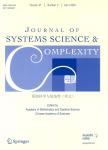FORMATION OF SOCIAL NORMS IN COMMUNICATING AGENTS WITH COGNITIVE FRAMEWORKS
FORMATION OF SOCIAL NORMS IN COMMUNICATING AGENTS WITH COGNITIVE FRAMEWORKS作者机构:Japan Advanced institute of Science and Technology 日本 923-1292 Otaru University of Commerce 日本 047-8501
出 版 物:《Journal of Systems Science & Complexity》 (系统科学与复杂性学报(英文版))
年 卷 期:2001年第14卷第1期
页 面:54-74页
核心收录:
学科分类:0711[理学-系统科学] 12[管理学] 1201[管理学-管理科学与工程(可授管理学、工学学位)] 07[理学] 08[工学] 0811[工学-控制科学与工程] 081103[工学-系统工程]
基 金:a Grant-in-Aid for Scientific Research (No.12780269) from the Ministry of Education Science and Culture of Japan. S.E. is sup
主 题:Formation of norms cognitive framework multi-agent model.
摘 要:This article deals with the process of formation of norms in societies in which individuals act according to their own cognitive framework under communication. The individuals acquire information from others and interpret it. The way of individual’s action is revised through changing the source of information and reforming the method of interpretation. Through the revising mechanisms, assemblages sharing cognitive frameworks are established. First individuals adopt the same source of information and then arrange the shared cognitive framework. The assemblages are considered as groups with common norms, since the same cognitive framework gives actions coherency. In the process of formation the two revising mechanisms function in turn. The intensity of interaction among individuals affects the period to build norms and the size of groups sharing the norms. The size develops under strong interaction but the period becomes long. The dependency of the average size of norms on the strength obeys a power law.



